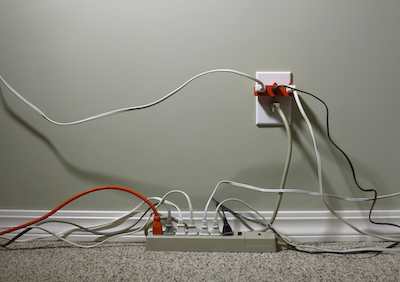What Does Burnout Feel Like?
- Home
- Signs of Burnout in a Christian Leader
- What Is Burnout
- What Does Burnout Feel Like
What does burnout feel like?
It feels like "too much." And, it feels like "not enough."
Those two expressions may sound simple, and might even be mistaken for being all too common. But if you are experiencing, or on the edge of burnout, "too much" and "not enough" can go deep to the core of your soul. It can be numbing and paralyze even the best leader or professional.
Obviously those two sentiments may appear as complaints we all make, but left unaddressed over a protracted period of time, they lead to frustration and disillusionment. Addressing them is a key to stress management and personal well-being.

1. Burnout Feels Like "Too Much"
What does burnout feel like? It feels like too much. There is just too much demand for something, or a lot of things - hours, emotional energy, running into roadblocks.
There's too much frustration, too much hurt. Too much running into irregular people. Too much ...
Just when you think you can't take anymore, there's more!
"Personal care has been an issue since I became CEO. It is simply a 24/7 position. I do my best to compartmentalize it in order to create some personal life space, but ..." CEO
None of these things are bad in and of themselves. Normally you can easily handle any one of them on its own. It's when they are required with
- too great an intensity, or
- quantity over a prolonged period of time (remember when you said, "It just keeps coming")
Some leaders are vulnerable to having too much demand placed upon them. Sometimes that demand comes from others. Sometimes it is self-generated. In other cases, if you couple this with cutbacks or other financial pressures, you have a recipe for personal disaster that a few stress management techniques might not even solve.
One common thread? Oftentimes we don't have control over those demands that are being placed upon us by others. We are expected to deliver but we don't have the levers of control to determine how that best happens, or even if it should happen. Random decisions made by others can change things so fast - and not always for the good.
If you want the academic answer to what is burnout, visit this page for my summary of the WHO definition. Here's the actual link to the World Health Organization's information on burnout.

2. Burnout Feels Like "Not Enough"
What does burnout feel like? It feels like not enough. If you can have too much demand for something, you can also experience not enough resources to handle that demand.
What causes burnout is not having enough resources or reserves to draw from when you need it. Those resources may be time off to recover and refresh, skill, knowledge, assistance, or even attitude. Since every person is different, we all need to be able to draw from resources that are quite unique to us as an individual.
"My wife is concerned for my well-being and is simply convinced that it isn't worth it. She is very supportive, but regularly witnesses the impact of the position." CEO
If you have intense demand over an extended period of time with diminished resources, you run the risk of stress, overload and increasing burnout symptoms. Leaders become demotivated, dispirited and even depressed. Periods of intensity with adequate resources to meet the demand are perfectly normal.
What You Might be Experiencing that Could Point to Approaching Burnout
These two, a sense of too much demand, and a sense of not enough resources to handle that demand, over an extended period of time are trends that the wise leader needs to be attuned to. They will affect you, and ultimately your people.
Try taking this Overload Assessment that I have created. It may be of help as you think about "too much" and "not enough."
Here are five things you might notice as you get closer and closer to burnout.
- A loss of energy
- A loss of involvement
- A loss of effectiveness
- A loss of health and a sense of well-being
- A loss of control
Here is the key point. When you sense either a long period of 'too much' or 'too little', what will you do about it? Take this as your call to action. Awareness with action will lead to solutions.
Essentially there are only two methods to deal with burnout. Either decrease the demand or increase the resources available to deal with it.
If you want a more academic answer to what is burnout, visit this page for the World Health Organization definition, and more. I think you'll find it bears a lot of resemblance to my practical illustration.
Getting Real Clear About What You Want
Getting real clear about moving forward and creating momentum will be critical to our work together. No matter how stressed you might feel, you have projects, programs, goals or causes that need to move forward.
Workplace performance and productivity are a must. Not many leaders can avoid that. So, we have two things to pay attention to.
Personal – Those things you're dealing with internally, such as stress, overload or burnout
Tactical – All the things happening externally, like planning, decision-making, troubleshooting, communicating or managing others
What are the Accompanying Benefits of Executive Coaching to Deal with Burnout
You need support either to avoid burnout or to get over burnout.
Not only can we deal with burnout, but through our work together, you will regain energy to contribute to:
- More insightful discussions
- More focused meetings
- More informed options
- More complete solutions
- More strategic execution
- More achieved outcomes
I never insist my clients use any particular tools or methods, but if the need is there, I want you to be aware I have the advanced think-it-through tools to help you tackle situations with new energy and insight.
Get Past Asking, "What does burnout feel like?" and Get on to Saying, "I'm Glad I'm Through That."
Bottom line – Our focus in working together is YOU. We deal with overload or burnout AND we pay attention to those things that can accelerate your ability to move projects, programs and priorities forward.
If you are a Christian leader, executive, or senior-level professional, I understand what you are going through.
Coaching Christian executives and leaders to avoid burning out at work.
Contact me today to get started or to sponsor a leader or professional for coaching.
Contact me here Privacy Policy
© G.E.Wood and Associates. All Rights Reserved in all media.
G.E. Wood and Associates is an international coaching firm registered in Ontario, Canada
142 Pratt Crescent, Gravenhurst, Ontario, Canada, P1P 1P5